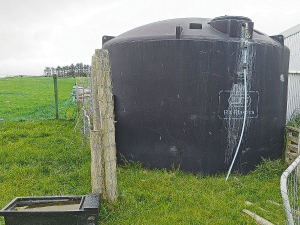Nasty surprise
The late expansion of Three Waters to Five by Minister Nanaia Mahuta seems to have caught her own Cabinet colleagues out, with even the Prime Minister's office taking a while to get its spin straight on this one.
 Clutha District is undertaking an assessment of its rural water supplies to see how the water schemes could operate in the future.
Clutha District is undertaking an assessment of its rural water supplies to see how the water schemes could operate in the future.
An assessment of Clutha District’s rural water supplies is currently underway.
The assessment aims to look at how the schemes could operate in the future.
It comes as the Government seeks to pass the Water Services Entities Bill which has just hit its second reading in Parliament.
If passed, the Bill would establish four water services entities to provide water services in New Zealand.
Clutha District Mayor Bryan Cadogan says reforms are distinctly different for the urban three waters and the rural one water.
“For the most part our rural areas only have a one water – a rural drinking water supply, whereas most urban areas have three waters – drinking water, stormwater and wastewater,” he says.
Council and the rural water scheme’s working party have been working with the Department of Internal Affairs (DIA) following on from earlier work as part of the Rural Supplies Technical Working Group.
“An independent assessment, funded by the DIA, is being undertaken by Morrison Low, looking at the benefits, costs and risks of customer-ownership versus water services entity ownership and operation,” Cadogan says.
Results of the work will be made publicly available and will help to determine whether an owner operated scheme is a viable option.
The assessment will also inform three waters legislation to be fully enacted in mid-2023.
“This work is important – it will play a critical part in determining the future of our rural water schemes and the communities they serve. Council and our rural water scheme committees have been working to advocate for the district’s rural drinking water schemes.”
Clutha District has 11 rural water schemes that provide water for farm use and domestic consumption. A number of townships in the districts are connected to these schemes, including Kaka Point, Waihola, Clinton, Tokoiti, Tuapeka Mouth, Waitahuna, Heriot, Pukerau and Waikaka.
Under the Three Waters reforms, all council-owned and operated drinking water, wastewater, and stormwater services will be transferred to four new water service on 1 July 2024. After this date, councils will no longer have direct roles in managing and operating three water services.
Privately owned and operated water schemes will not be affected.
The Government has agreed, in line with a recommendation from the recent Rural Supplies Technical Working Group, that users of council-owned drinking water schemes that exist primarily to provide water for agricultural purposes may have the option to be excluded from the entity and seek direct ownership and operation of their scheme under certain conditions, yet to be determined in legislation.
“Over the next few months, work will include discussions between council, DIA, farmers, scheme chairs and contractors to ensure the work is factual and practical. If the assessment shows customer ownership is viable, then we would look at how best to structure this option and how Government’s conditions could be met,” says Cadogan who is also chair of the Rural Supplies Technical Working Group.
The work happening in Clutha District will inform approaches to similar assessments of other council owned mixed-use rural water supplies throughout New Zealand.
More information will be sent to rural water scheme consumers in early 2023 to inform them of the results of the assessment.
The 5+ A Day Charitable Trust has launched a collection of affordable recipes designed to turn everyday vegetables into seasonal stars.
Jane Mellsopp has been confirmed as the new Government Appointee to the New Zealand Meat Board (NZMB).
To celebrate the tenth anniversary of its annual Good Deeds competition, Rabobank will give away $100,000 to improve rural community hubs, schools, clubrooms, and marae across New Zealand.
Agricultural and veterinary product supplier Shoof International has appointed Michaela Dumper as its new chief executive.
Federated Farmers is celebrating following the Government's announcement that young farmers will be able to use their KiwiSaver funds to buy their first home or farm.
The Meat Industry Association of New Zealand (MIA) today announced that Chief Executive Officer Sirma Karapeeva has resigned from the role.

OPINION: A mate of yours truly reckons rural Manawatu families are the latest to suffer under what he calls the…
OPINION: If old Winston Peters thinks building trade relations with new nations, such as India, isn't a necessary investment in…